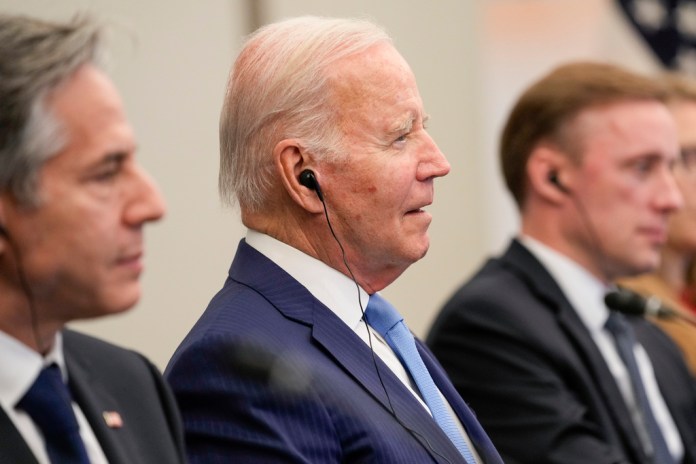An Original: New Book ‘Scalia’ Traces ‘Exceptional Accomplishments’ Of Justice’s Early Academic Career
Below is an interview with James Rosen (journalist and author) about his new book. “Scalia, Rise to Greatness 1936-1986” (Regnery Publishing. March 2023).
DW: James. You’ve written biographies of other Washington power brokers (John Mitchell and Dick Cheney). What attracted Justice Scalia to you?
Rosen: My work in “Scalia, Rise to Greatness 1936-1986“Can, in a certain sense, be traced back my high school years in the 1980s when I first watched Justice Scalia on PBS.” “The Constitution: That Delicate Balance.” This was a show that featured a moderator (usually Fred Friendly, who was the former president of CBS News) discussing hypothetical crises with a panel consisting of distinguished guests (e.g. Scalia and Sandra Day O’Connor, Gerald Ford) in theater-in-the round before a live audience.
Scalia struck me immediately and unmistakably as an amazing woman. Different The other panelists were trenchant, funny, smart and compelling. Before I became Washington correspondent in 1999, I had already read his Princeton lectures. “A Matter of Interpretation: Federal Courts and the Law” (1997).
Janet Fries/Getty Images
The ideas Scalia was championing were considered, at the time, revolutionary — or, more precisely: counter-revolutionary, a response to the Warren Court — but they made perfect sense to me, a non-lawyer. He believed that judges or justices should be guided by the Constitution and statutes when they interpret the meaning. Original meaning You should understand the law as it was at the time it was enacted, not by looking at policy preferences or social trends.
Scalia further argued that the best evidence to understand the law’s original intent was not the floor debate or any other sound-and fury ephemera. The original meaning was to be deduced, principally and decisively from the measure as it was passed by Congress and signed by the president. This approach is consistent with Scalia’s Constitutional and Statutory interpretation. So called “textualism.”
Again, to my layman’s eye, the notion that judges should rely chiefly on the text of a law when deciding its meaning seemed so … elemental … so obviously the correct approach, that any Other amounts To mad flight from basic reading comprehension
When I arrived at the Capitol, a letter was sent to me requesting an interview. Our correspondence over the next two years, humorous and revealing, and the pair of one-on-one lunches we shared at his beloved AV Ristorante — vinous, unforgettable, and off the record — convinced me I would write about him someday. Although the conversations at those lunches will not be recorded, some excerpts from our correspondence will appear on the second and final volume. “Scalia: Supreme Court Years, 1986–2016.”
DW: It is believed that Antonin Scalia, the young man, was a talented student. Does this rumor have any validity?
Rosen: This is no rumor — it’s documented fact!
Scalia was the sole child of an Italian immigrant father, who could not speak English at all when he arrived in America in 2020. However, he became a well-respected professor of Romance languages. His mother was also an immigrant from Italy and was a teacher in elementary schools.
Scalias were Catholics. So from these early influences — the emphasis the Church placed on sacred texts, young Nino’s Jesuitical education, his parents’ devotion to the classics of literature and music — Antonin Scalia emerged with a profound respect for the inviolability of foundational texts. This was a trait he continued to use as a Supreme Court and appellate court jurist.
Scalia was valedictorian of his high school. His college was then magna cum laude From law school.
Courtesy Regnery Publishing
DW: You interviewed Scalia’s former students. Was Scalia’s academic acumen what they thought?
Rosen: Scalia was a graduate of Xavier High School, a rare combination of a Jesuit military academy and academic institution. In later years, Scalia delighted in telling his audience how he commuted from Queens to Manhattan by subway, his.22 rifle strapped over his shoulder.
Courtesy Regnery Publishing
A 1952 student newspaper profile of him – the first ever published – noted that Nino had “compiled one of the most enviable records at Xavier,” Each year, 19 First Honor awards were received, one for each marking period and the Gold Medal for class distinction. “His name,” According to the article, “has become synonymous with exceptional accomplishment.”
Scalia became Xavier valedictorian in the following year. His graduation photo shows a handsome, decorated cadet. “Nino” Both students and teachers have always loved it. “He was a favorite of the Jesuits,” A classmate shared this with me: “because he was bright and he was involved.”
Scalia was a friend’s unusually friendly personality. She is quick-witted, self-deprecating, and genuinely cares about the problems and stories of others. Nino, a charming grandeur, might take over a piano at someone’s home and lead a group in singing Christmas carols or show tunes. “Classmates were intrigued by Scalia’s personality,” Another early profile: “a combination of scholarly seriousness and life-of-the-party gregariousness.”
Scalia’s greatest strength was his ability to work hard. “People just competed for second,” A friend reminded me. “he was just so superior academically.” “All my life I had been good in academics,” Scalia stated. “I kept my nose to the grindstone.” Once, the justice said that he didn’t “look back with misty-eyed mellow reflection upon my years at Harvard [Law School],” He recalled it as “years of really terribly hard work … I don’t think I have ever studied harder, especially during the first year.”
7/7/1986 President Reagan with Judge Antonin Scalia, Oval Office. Courtesy Regnery Publishing
DW. You were able get Justice Scalia’s early report cards. What was the truth about Scalia, the student?
Rosen: With the help of the Scalia families, I was able to obtain the report card for the future justice from P.S. 13 in Queens, where Nino grew up. Nino earned 40 As in nine subjects. There were five Bs in four subjects (composition geography history/civics and sewn), which were quickly corrected with an A.
“Scalia: Rise to Greatness” It contains the most complete account Scalia’s academic life in print.
DW. Scalia would eventually become a professor at both UVA (and The University of Chicago). You were able to interview Scalia’s former students. Did you find a common theme?
Rosen: I interviewed students during his tenures as a professor at University of Virginia Law School, 1967-71. Cover Of “SRTG,” John Caruso of Regnery created the design. This rare photograph was taken from the archives of an UVA student newspaper.
Courtesy Regnery Publishing
Scalia’s high school acting skills were recalled by students. He was known for his great shows of theatricality, including running backwards and forwards to each end of the stage in order to portray the characters disputing a contract. One student shared with me, for the first time anywhere, what Professor Scalia said to his students on the grim morning after the assassination of Robert F. Kennedy — as the class’s scheduled test went forward.
Scalia’s FBI files were hundreds of pages long, and they were declassified following his death. They include the results of four background check in 14 years, as Scalia rose through both the executive and judiciary branches. His students gave Scalia only high marks. According to many, Scalia’s time in Chicago, along with Maureen Scalia’s, was less enjoyable than the UVA sunny experience. Scalia still received high ratings from Chicago students. But there were also some incidents, and some criticisms, that Scalia was not subject to at UVA. Scalia was also an academic in between these two posts. However, Scalia did serve in the Nixon administration and Ford administrations. So the frictions that occurred in Chicago must be attributed to a new politicized view among Chicago students. Scalia’s faculty and his government service.
Chip Somodevilla/Getty Images
* * *
James Rosen Is He is a leading journalist, historian, and best-selling author. After two decades of outstanding reporting at Fox News, he is now the chief White House correspondent for Newsmax. His new book “Scalia, Rise to Greatness 1936-1986Regnery Publishing, March 20,23.
The views expressed in this article are the author’s and not necessarily those of The Daily Wire.
“The views and opinions expressed here are solely those of the author of the article and not necessarily shared or endorsed by Conservative News Daily”
" Conservative News Daily does not always share or support the views and opinions expressed here; they are just those of the writer."




